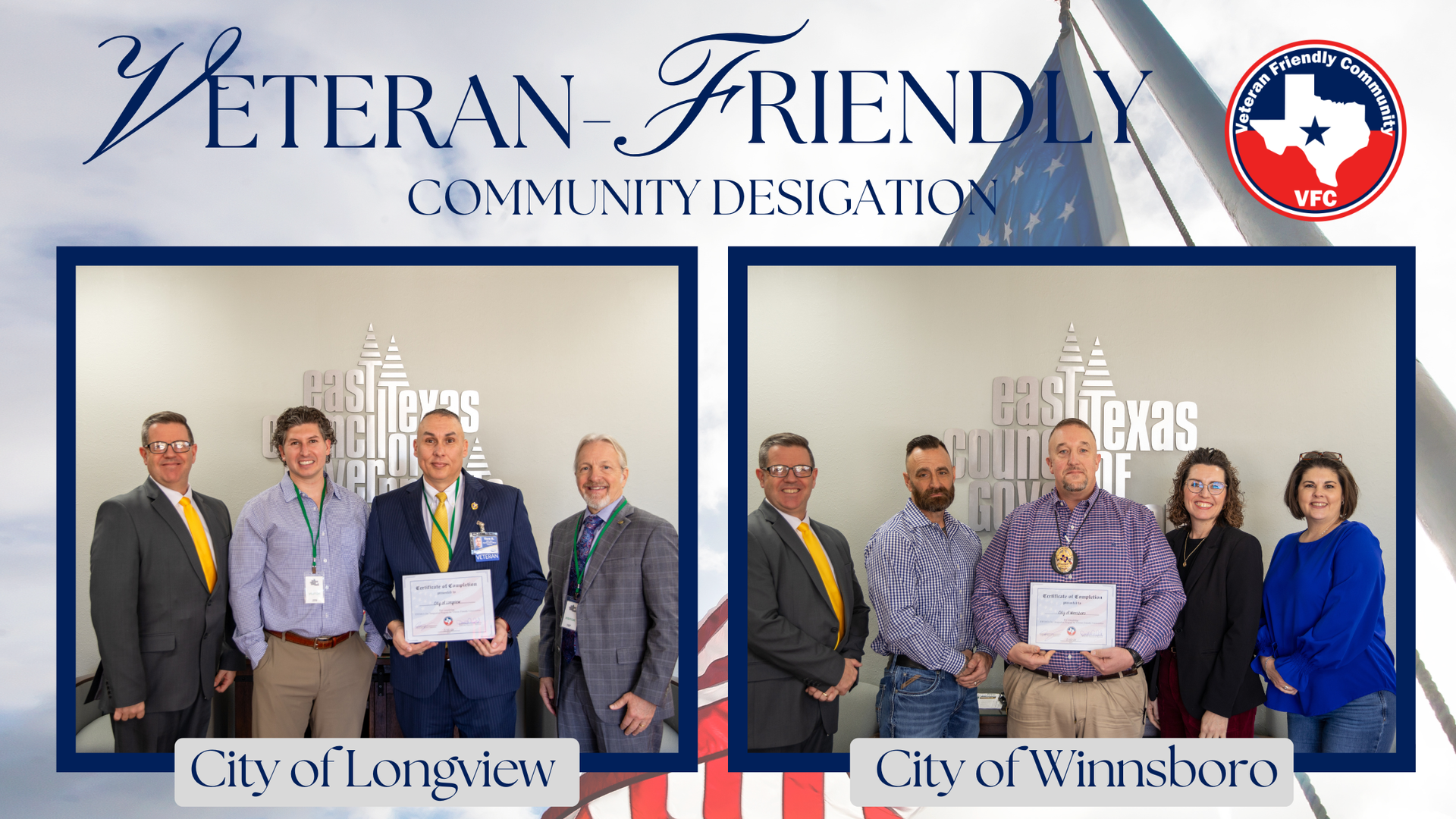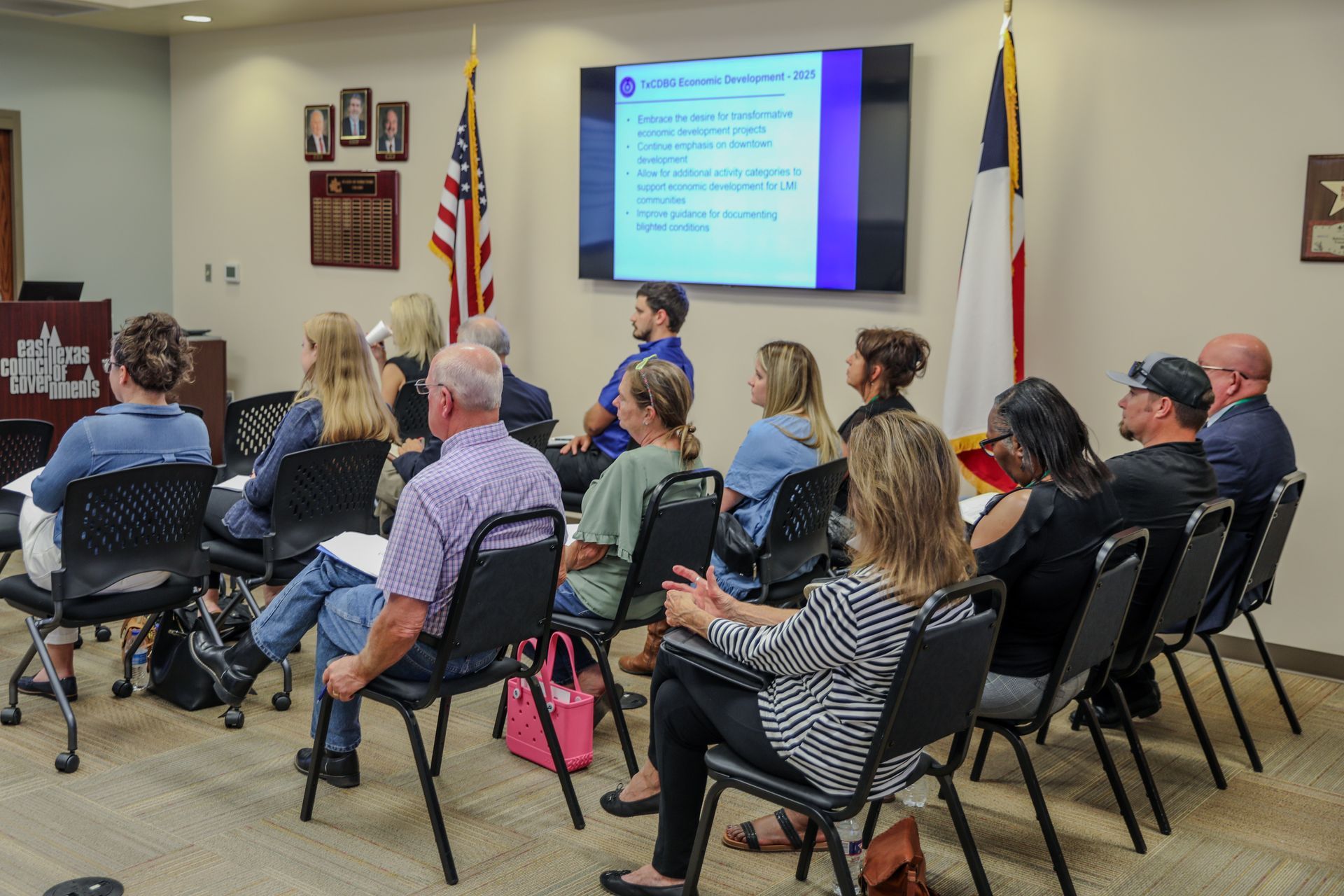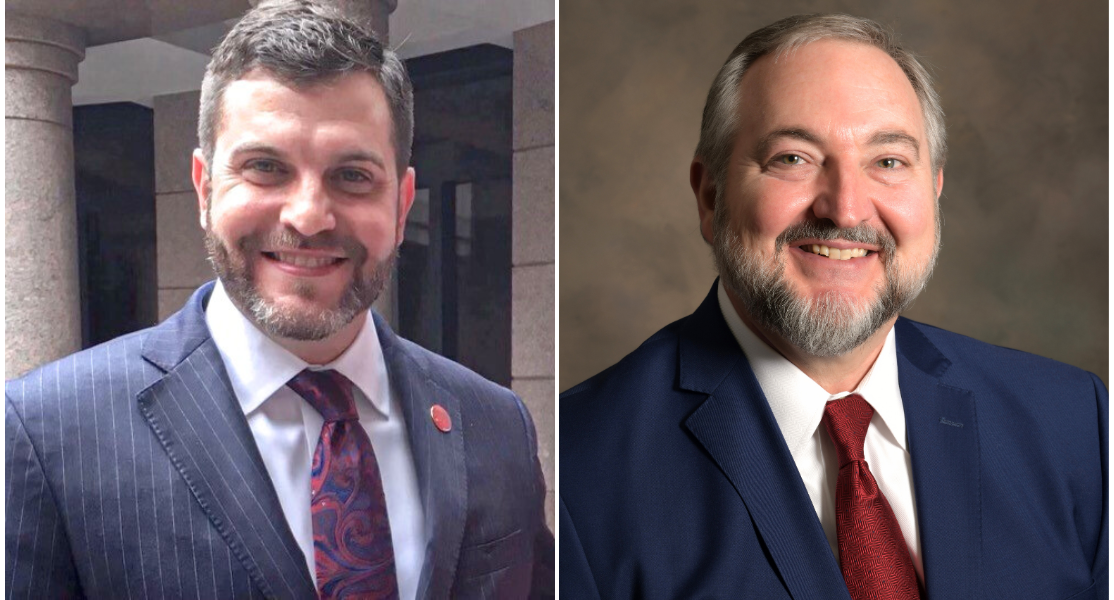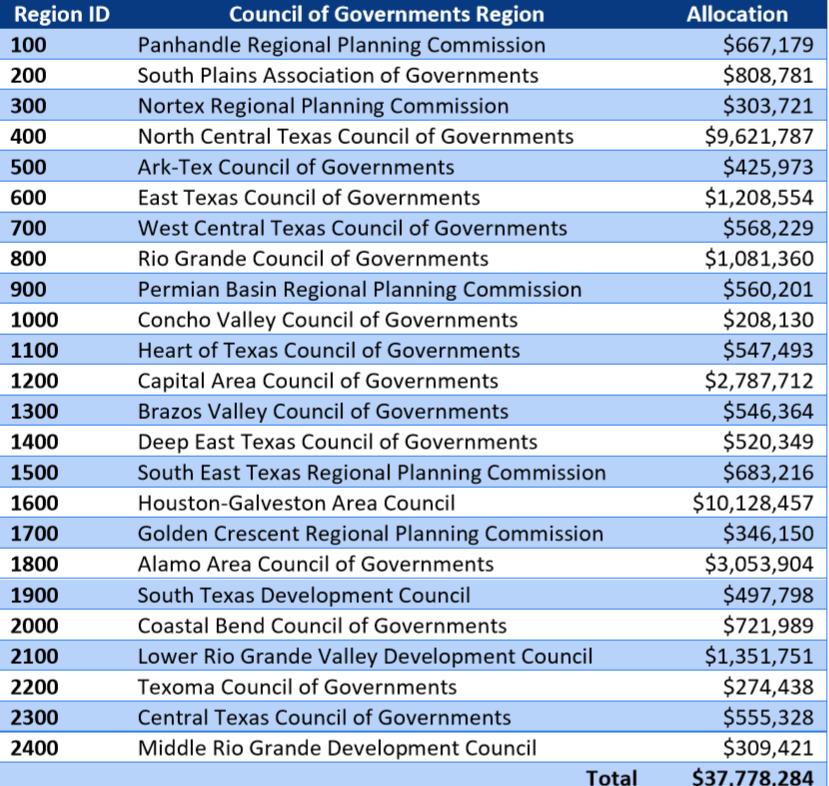Criminal Justice Division Funding Announcement: Coronavirus Emergency Supplemental Funding (CESF) Program, FY2020
Office of the Governor, Public Safety Office • April 21, 2020

Purpose
The purpose of this announcement is to solicit applications for projects that seek to prevent, prepare for, and respond to the coronavirus.
Available Funding
Federal Funds are authorized under Division B of H.R. 748, Pub. L. No. 116136 (Emergency Appropriations for Coronavirus Health Response and Agency Operations); 28 U.S.C. 530C. CESF funds are made available through a Congressional appropriation to the U.S. Department of Justice, Bureau of Justice Assistance. All awards are subject to the availability of appropriated federal funds and any modifications or additional requirements that may be imposed by law.
Texas expects to make approximately $37.8 million available to local units of government through regionally based allocations using the Regional Councils of Governments boundaries. Please see the Regionally Based Allocations Appendix at the end of this announcement for more information.
Eligible Organizations
Applications may be submitted by Native American tribes and units of local government, which are defined as a non-statewide governmental body with the authority to establish a budget and impose taxes.
Note: Units of local government eligible for a direct award from the U.S. Department of Justice, Bureau of Justice Assistance (BJA) should first seek funds directly through BJA. The list of local allocations for direct BJA awards to Texas jurisdictions can be found here, and the federal solicitation is available here. Applications are due to BJA by May 29, 2020.
Application Process
Applicants must access the PSO’s eGrants grant management website at https://eGrants.gov.texas.gov
to register and apply for funding. For more instructions and information, see Developing a Good Project Narrative Guide, available here.
Action Date
Funding Announcement Release 04/15/2020
Online System Opening Date 04/15/2020
Final Date to Submit and Certify an Application 06/15/2020 at 5:00 PM CST
Earliest Project Start Date 02/01/2020
| Action | Date |
|---|---|
| Funding Announcement Release | 04/15/2020 |
| Online System Opening Date | 04/15/2020 |
| Final Date to Submit and Certify an Application | 06/15/2020 at 5:00 PM CST |
| Earliest Project Start Date | 02/01/2020 |
***Applications will be reviewed and processed as they are received. PSO intends to issue awards in an expeditious manner and encourages applicants to submit prior to the deadline in order to receive notification of an award as soon as reasonable. ***
Project Period
Projects must begin on or after 02/01/2020 and may not exceed a 12-month project period.
Funding Levels
Minimum: $10,000
Maximum: None
Match Requirement: None
Standards
Grantees must comply with standards applicable to this fund source cited in the State Uniform Grant Management Standards (UGMS), Federal Uniform Grant Guidance, and all statutes, requirements, and guidelines applicable to this funding.
Eligible Activities and Costs
Funds must be utilized to prevent, prepare for, and respond to the coronavirus. Allowable projects and purchases include, but are not limited to, overtime, equipment (including law enforcement and medical personal protective equipment), hiring, supplies (such as gloves, masks, sanitizer), training, travel expenses (particularly related to the distribution of resources to the most impacted areas), and addressing the medical needs of inmates in local and tribal jails and detention centers.
Examples of allowable costs include:
- Personnel Overtime (Peace Officer, Jailer, Correctional Officer, Medical, and other Essential Staff)
- Personnel Protective Equipment (PPE)
- Supplies (i.e. gloves, masks, sanitizer, disinfectant)
- Temporary Staff
- Medical care for inmates that have tested positive for COVID-19
- Any other costs associated with the implementation of the Centers for Disease Control and Prevention (CDC) COVID-19 Guidance documents, specifically:
- Interim Guidance on Management of Coronavirus Disease 2019 (COVID-19) in Correctional and Detention Facilities
- What Law Enforcement Personnel Need to Know about Coronavirus Disease 2019 (COVID-19)
- Interim Guidance for Emergency Medical Services (EMS) Systems and 911 Public Safety Answering Points (PSAPs) for COVID-19 in the United States
- Interim Guidance for Businesses and Employers to Plan and Respond to Coronavirus Disease 2019 (COVID-19)
Eligibility Requirements
- Entities receiving funds from PSO must be located in a county that has an average of 90% or above on both adult and juvenile dispositions entered into the computerized criminal history database maintained by the Texas Department of Public Safety (DPS) as directed in the Texas Code of Criminal Procedure, Chapter 66. The disposition completeness percentage is defined as the percentage of arrest charges a county reports to DPS for which a disposition has been subsequently reported and entered into the computerized criminal history system.
- Beginning January 1, 2020, counties applying for grant awards from the Office of the Governor must commit that the county will report at least 90 percent of convictions within seven business days to the Criminal Justice Information System at the Department of Public Safety. By January 1, 2021, such reporting must take place within five business days.
- Eligible applicants operating a law enforcement agency must be current on reporting Part I violent crime data to the Texas Department of Public Safety (DPS) for inclusion in the annual Uniform Crime Report (UCR). To be considered eligible for funding, applicants must have submitted a full twelve months of accurate data to DPS for the most recent calendar year.
- The Texas Department of Public Safety (DPS) has established a goal set by the Texas Legislature for all local law enforcement agencies to implement and report crime statistics data by using the requirements of the National Incident-Based Reporting System (NIBRS) no later than September 1, 2019. Additionally, the Federal Bureau of Investigations (FBI) will collect required crime statistics solely through the NIBRS starting January 1, 2021. Due to these upcoming state and federal deadlines, grantees are advised that eligibility for future grant funding may be tied to compliance with NIBRS. Financial grant assistance for transitioning to NIBRS may be available for your jurisdiction from the Criminal Justice Division (CJD).
- Local units of government, including cities, counties and other general purpose political subdivisions, as appropriate, and institutions of higher education that operate a law enforcement agency, must comply with all aspects of the programs and procedures utilized by the U.S. Department of Homeland Security (“DHS”) to: (1) notify DHS of all information requested by DHS related to illegal aliens in Agency’s custody; and (2) detain such illegal aliens in accordance with requests by DHS. Additionally, counties and municipalities may NOT have in effect, purport to have in effect, or make themselves subject to or bound by, any law, rule, policy, or practice (written or unwritten) that would: (1) require or authorize the public disclosure of federal law enforcement information in order to conceal, harbor, or shield from detection fugitives from justice or aliens illegally in the United States; or (2) impede federal officers from exercising authority under 8 U.S.C. § 1226(a), § 1226(c), § 1231(a), § 1357(a), § 1366(1), or § 1366(3). Lastly, eligible applicants must comply with all provisions, policies, and penalties found in Chapter 752, Subchapter C of the Texas Government Code.
- Each local unit of government, and institution of higher education that operates a law enforcement agency, must download, complete and then upload into eGrants the CEO/Law Enforcement Certifications and Assurances Form certifying compliance with federal and state immigration enforcement requirements. This Form is required for each application submitted to OOG and is active until August 31, 2021 or the end of the grant period, whichever is later.
- Eligible applicants must have a DUNS (Data Universal Numbering System) number assigned to its agency (to request a DUNS number, go to https://fedgov.dnb.com/webform).
- Eligible applicants must be registered in the federal System for Award Management (SAM) database located at https://sam.gov/.
Failure to comply with program eligibility requirements may cause funds to be withheld and/or suspension or termination of grant funds.
Prohibitions
Grant funds may not be used to support the unallowable costs listed in the Guide to Grants
or any of the following unallowable costs:
- Law enforcement equipment that is standard department issue; and
- Any other prohibition imposed by federal, state or local law or regulation.
Selection Process
Application Screening: PSO will screen all applications to ensure that they meet the requirements included in the funding announcement, to understand the overall demand for the program and to identify significant variations in costs per item. After this review, the Office of the Governor will determine if eligible applications can be funded based on funds available, if there are cost-effectiveness benefits to normalizing or setting limits on the range of costs, and if other fair-share cuts may allow for broader distribution and a higher number of projects while still remaining effective.
Final Decisions: The PSO executive director will consider staff recommendations along with other factors and make all final funding decisions. Other factors may include cost effectiveness, overall funds availability, state government priorities and strategies, legislative directives, need, geographic distribution, balance of focuses and approaches, or other relevant factors.
PSO may not fund all applications or may only award part of the amount requested. In the event that funding requests exceed available funds, PSO may revise projects to address a more limited focus.
Contact Information
For more information, contact the eGrants help desk at eGrants@gov.texas.gov
or (512) 463-1919.
Regionally Based Allocations Appendix
Texas is divided into 24 regions, each served by a voluntary organization of local governmental entities that coordinate programs and services to address needs that cross jurisdictional boundaries. PSO will use the allocations below as a guide when making funding decisions for applications within each region. Funds remaining within a regionally based allocation after all eligible applications have been selected for award from that region may be reallocated to other regions.
Please visit https://txregionalcouncil.org/regional-councils/
to determine which Council of Governments region your jurisdiction belongs to.

At its February meeting, the East Texas Council of Governments Executive Committee awarded the City of Longview and the City of Winnsboro as this year’s recipients of the Veteran-Friendly Community Designation. The Veteran-Friendly Community Designation program was created in 2025 to recognize communities that actively welcome and support veterans and their families by meeting real needs in everyday life. In its first year, ETCOG designated the City of Tyler/Smith County and the City of Quitman/Wood County as the program’s inaugural Veteran-Friendly Communities. A Veteran-Friendly Community is defined as one that provides ongoing support in areas including employment, housing, transportation, health care, education, and overall quality of life. Communities seeking designation were required to meet established standards, including: Provide proof of community and organizational support. Submit a comprehensive community profile with key information for veterans and their families, including demographics, housing, and healthcare access. Maintain a community development strategy that directly addresses veterans’ needs. Complete an initial and annual self-assessment to identify service gaps and guide improvements. “Recognizing Longview and Winnsboro as Veteran-Friendly Communities reflects the real work these cities are doing for the men and women who served our country,” said ETCOG Executive Director David Cleveland. “Veterans deserve more than words of thanks. They deserve access to jobs, healthcare, housing, and support systems that help them build strong lives at home. These communities are setting the standard for what that looks like in East Texas.” “Programs like this help communities take a clear look at what they’re doing well and where they can grow,” said ETCOG Special Projects Director David Scott. “It’s about making sure veterans can live, work, and raise families in places that value their service and invest in their future.” With continued interest from communities across the region, ETCOG plans to reopen the application process annually to allow more cities and counties to pursue the Veteran-Friendly Community Designation.

ETCOG is proud to host the Texas Department of Agriculture on March 12th to hold a TxCDBG Regional Outreach Meeting. Join us to hear a TxCDBG grant program overview of requirements, allocation formula, upcoming funding opportunities, and TDA's one-year action plan. Eligible applicants in our region are all non-entitlement communities, which include all of our cities with the exception of Tyler, Marshall, and Longview. When Thursday, March 12, 2026 10:00 AM Where ETCOG Headquarters 3800 Stone Road Kilgore, TX 75662 Please RSVP your attendance!

ETCOG is sharing Texas Department of Agriculture (TDA) updates affecting its policies and manuals, and a webinar offering an overview of new forms in its grant management tool. Policy Issuance 25-01, and revision of the 2025 TxCDBG Implementation Manual Revisions for clarity in Chapter 5 Procurement Procedures and Chapter 8 Force Account Labor. New guidance in Chapter 1, Administration and Reporting, for state public hearing requirements. New guidance in Chapter 2, Financial Management, for changes to the timing of disbursement documentation requirements. New guidance in Chapter 4, Contract Special Conditions for federal requirements. Policy Issuance 25-01 is effective January 1, 2026. Policy Issuance 25-01 can be found on the TDA website. The same revisions have been incorporated into the 2025 Implementation Manual chapters posted to the TDA website, marked in blue text. Updates to TDA-GO & Webinar TDA has prepared several new forms that include grant management tools. TDA has scheduled a webinar to walk through these tools and will provide additional resources as needed: WEBINAR: CDBG Over Coffee: New TDA-GO Financial Management Tools webinar January 22, 2026 Fund Source Calculator This tool calculates the total maximum grant amount and minimum matching funds amount based on actual project costs. The form pulls data entered in TDA-GO as project cost obligations (from Materials and Services Reports) and expenditures (from Payment Requests), as well as the grant agreement funding amounts and match ratio commitment. Written guidance - How to use the Fund Source Calculator - can be found on the TDA website. Disbursement of Funds documentation A new form in TDA-GO collects bank records and cancelled checks to document disbursement of funds throughout the grant agreement period. These records are currently required for during the closeout monitoring process and can be a challenge for some communities to collect and organize. Disbursement records will be required promptly after each grant payment is issued. Written guidance - How to Enter Disbursement Detail - can be found on the TDA website. For existing grants ending on or after March 1, 2026, Grant Recipients should begin uploading documentation for previously approved Payment Requests. TDA will begin holding Payment Requests for grants that have not yet provided this documentation on March 1, 2026 .

The East Texas Council of Governments (ETCOG) has announced a significant step in expanding broadband access for one of its member communities in East Texas. The City of Lakeport has been awarded $200,000 in grant funding from the Federal Communications Commission under the Rural Digital Opportunity Fund program to improve broadband access in underserved and unserved areas of the community. ETCOG collaborated with City of Lakeport leadership to seek broadband partners and helped secure Zito West Holding, LLC to expand reliable, high-speed internet service for local residents. The partnership brings together local leadership, a private broadband provider, and regional planning assistance to strengthen digital access throughout the city. Through this initiative, Zito will construct a new fiber-to-the-home network designed to serve approximately 190 homes in Lakeport. Zito currently provides fiber service to 348 homes in the city. The expanded network will offer upload and download speeds of up to 1 gigabit per second. Construction began on December 15 th . “The City of Lakeport sincerely appreciates its partnership with the East Texas Council of Governments (ETCOG) in the effort to acquire broadband internet access for our community. Through ETCOG’s leadership, technical expertise, and support in navigating funding and planning opportunities, Lakeport has been able to move forward with expanding reliable broadband services. This partnership strengthens our ability to support local businesses, enhance educational opportunities, improve access to healthcare, and promote long-term economic growth. The City of Lakeport values ETCOG’s continued collaboration and commitment to improving connectivity for communities across East Texas,” said Mayor Johnny Sammons. “This project demonstrates how planning and partnerships can bring reliable broadband to communities across East Texas,” said David Cleveland, Executive Director of ETCOG. “We’re proud to support Lakeport in connecting residents and businesses to essential digital services.”

ETCOG is pleased to announce new leadership for its Chief Elected Officials – Rural Transportation Planning Organization (CEO–RTPO) Board. At its December 4 th meeting, the CEO–RTPO Board reappointed Marion County Judge Leward LaFleur as Chair and Camp County Judge AJ Mason as Vice Chair, and reappointed its Executive Committee members. The CEO–RTPO Board consists of the county judges from each of the 14 counties served by ETCOG, the Mayors of Longview and Tyler, the three Texas Department of Transportation District Engineers serving the ETCOG region, and the Executive Director of the North East Texas Regional Mobility Authority. The Board serves a dual function of shared oversight of the region's workforce programs with the Workforce Solutions East Texas Board and working directly with TXDOT to ensure that transportation priorities are developed and solutions implemented for the region's rural communities. "With deep admiration and respect for my colleagues, I express my sincere appreciation for their confidence in calling me to continue to serve as Chairman of the Chief Elected Officials –Rural Transportation Planning Organization Board. I have such esteem for these county judicial and city leaders, who sacrificially serve the needs and interests of East Texas. Together, as servants of the public's trust, we will continue to confront challenges and seize opportunities for the future of the 14 counties and cities in our region. With rich natural resources, the beauty of our lands, coupled with the values and strong work ethic of our people, East Texas sits in a strategic position to grow economically while maintaining the quality of life we all enjoy. As a son of Gregg County, God called me back to my East Texas roots after my service to our country through the U.S. Navy. Upon returning home to the piney woods, I had a burden in my heart to invest my life in serving my fellow East Texans. As I do that, I ask for the prayers of my colleagues and the people of East Texas," said Marion County Judge Leward LaFleur. Judge LaFleur joined the board in 2018, has served on its Executive Committee since 2021, and began his chairmanship in 2023. “Heartfelt congratulations to Chairman LaFleur on his re-election to lead the CEO-RTPO Board once again!! His leadership and dedication to the East Texas region are appreciated by his fellow County Judges and Mayors, who once again supported his candidacy, and by the entire East Texas Council of Governments staff!” said ETCOG Executive Director David Cleveland. Judge AJ Mason joined the board in 2016 and has served as its Vice Chair and on the Executive Committee since 2018. "Continuing to work with the other members of the CEO-RTPO board presents a great opportunity to serve our region as a whole. Bringing that knowledge and information back to Camp County is beneficial to the citizens I represent. Under Judge LaFleur's chairmanship, our region will continue to face new challenges in a productive way that will benefit all East Texans," said Camp County Judge AJ Mason. The board also reappointed its Executive Committee, which may meet on behalf of the full board as needed between regularly scheduled meetings. It is comprised of Chair LaFleur, Vice Chair Mason, Rusk County Judge Joel Hale, Cherokee County Judge Chris Davis, and Harrison County Judge Chad Sims. Under the Workforce Innovation & Opportunity Act, the CEO Board is responsible for the leadership and board appointments to the local workforce development board. The CEOs partner with the Workforce Solutions East Texas Board to build a premier workforce in the region and are the primary source of local workforce policy. ETCOG formed its RTPO in 2009 to provide a forum for local elected officials to establish rural transportation project priorities and planning, and provide direct input to TxDOT concerning those priorities for areas not included in a Metropolitan Planning Organization (MPO). Through the RTPO, all 14 of our counties and the cities not served by the Longview or Tyler MPOs can deliver a unified message to state and federal decision-makers on transportation needs and priorities. The Board meets during April, August, and December to address the joint business agenda of the CEO–RTPO Board in a blended meeting format. The full membership of the CEO–RTPO Board is available at www.etcog.org/about#GoverningBoards .

ETCOG welcomed about 60 guests last month for the ribbon-cutting of the new GoBus Maintenance Facility, located behind ETCOG Headquarters in Kilgore. The event marked the completion of a project that has been in discussion, planning, and construction for several years, bringing together local leaders, partner agencies, and community members to see the results firsthand. ETCOG's Executive Director, David Cleveland, opened the program by recognizing elected officials and partners who helped move the project forward. He noted that the new facility strengthens ETCOG's mission to support the needs of East Texans through dependable public transit and thanked the teams and contractors who worked hard to bring the building to life. Transportation Director Vince Huerta shared how the facility will improve daily operations for GoBus across the 14-county region. With added work bays, a wash bay, training space, and expanded parking, maintenance can be handled on-site, giving crews the tools they need to keep vehicles safe and ready for the road. TxDOT's Greg Davis spoke about how the $3.3M project showcased the value of strong cooperation between state and regional partners. ETCOG 1st Vice Chairman, Camp County Judge A.J. Mason, reflected on his experience reviewing the project from its earliest financial discussions to its completion. "When this project was first discussed, it was an idea on paper," he said. "Standing here today, it's rewarding to see those decisions become bricks and mortar...a place that will keep GoBus running safely for years to come." After the ribbon was cut, attendees toured the facility and shared conversations about the years of planning that led to this point. It was a moment that honored the work behind the scenes and the steady commitment to serving the region well.

East Texas public agencies, nonprofits, schools, and federally recognized tribes will soon have the chance to apply for FY 2027 grant funding through the Office of the Governor’s Public Safety Office. The application window for Criminal Justice programs opens Monday, December 15, 2025, and closes Thursday, February 12, 2026. ETCOG invites new and returning applicants from our fourteen-county region to attend free grant workshops hosted by our Public Safety team. Grant funding will be available for the following Criminal Justice programs: General Victim Assistance Direct Services Program (VOCA) Violence Against Women Justice and Training Program (VAWA) Juvenile Justice & Truancy Prevention Grant Program (JJ/TP) Criminal Justice Program (JAG) Weekly workshops for each grant category will be held online from December 20 through January 20, 2026. Participation is required for all applicants. To join a Criminal Justice grant workshop, visit www.pineywoods911.com/criminal-justice . Sessions are held on Tuesdays from 10:00 am to 11:15 AM on these dates: December 30, 2025 January 6, 2026 January 13, 2026 January 20, 2026 “The goal is to improve public safety, support victims of crime, and help jurisdictions address gaps in the region with funding that encourages practical solutions,” said ETCOG Public Safety Director Stephanie Heffner. “We guide applicants on what to include in their proposals and what they need to track once funding is awarded, so we can keep bringing strong public safety projects to East Texas.” At this time, funding for Homeland Security grant projects is paused. ETCOG will announce workshops to apply for the State Homeland Security Program and Law Enforcement Terrorism Prevention Activities grants once they open.

ETCOG announces that $3.1 million in grants from the Office of the Governor's (OOG) Public Safety Office have been awarded to East Texas jurisdictions and nonprofit organizations. These funds are aimed at enhancing public safety and supporting victims of crime. The program’s mission is to strengthen Texas communities by supporting initiatives that help victims recover and feel secure while also preventing crime through programs that: Prevent juvenile delinquency and support truancy prevention Provide services to victims of crime and address violence against women Support law enforcement and improve the criminal justice system Prevent child sex trafficking, bring justice to its perpetrators, and restore victims ETCOG's Public Safety Division assists jurisdictions in applying for these funds annually, and applications submitted for funding are ranked and scored by the ETCOG Criminal Justice Advisory Committee, which is comprised of local subject-matter experts from across the region. The following Victims of Crime Act, Justice Assistance, Violence Against Women Act, and Juvenile Assistance grants totaling $3,136,019.36 have been approved by the OOG for funding in East Texas: Victims of Crime Act Funds - $2,528,962.18 The Crime Victims Assistance Grant Program (VOCA) devotes resources to providing direct services to victims of crime to help them recover and navigate the justice system.



